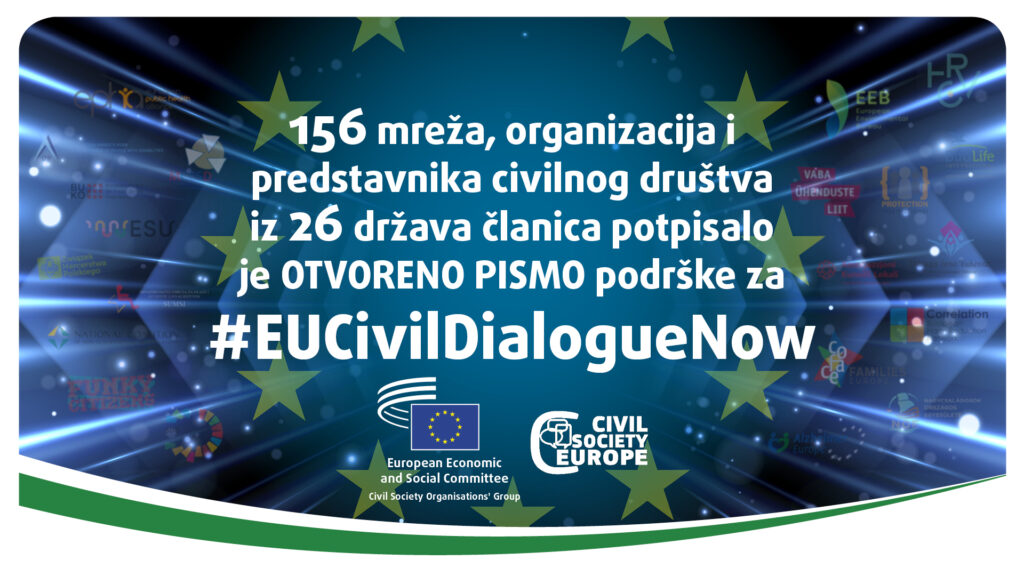
On January 24, European civil society sent an open letter to the Presidents of the European Commission and the European Parliament and to the Belgian Presidency of the Council of the European Union. The signatories of the letter call on the three main institutions of the European Union involved in the EU’s decision-making process to take concrete measures to conduct an open, transparent, and regular dialogue with civil society organizations in all policy areas, by Article 11 of the Treaty on European Union.
The open letter was initiated by the Group of Civil Society Organizations of the European Economic and Social Committee (EESC) and the “Civil Society Europe” network and contains concrete proposals for implementation. A total of 156 signatories supported the letter from 26 member states, including the SOLIDARNA Foundation. The signatories are 39 European networks, 85 national organizations, and 60 members of the EGSO Group of Civil Society Organizations.
Despite the legal provisions, the civil dialogue in the EU institutions is still uneven and unstructured.
Therefore, the signatories of the #EUCivilDialogueNow open letter call on the EU institutions to:
● launch an inter-institutional agreement on civil dialogue
● establish leading positions in each institution in charge of relations with civil society
● encourage and promote more intensive cooperation between civil and social actors, based on the recommendations of the Conference on the Future of Europe.
The signatories suggest that the first step should be a communication from the European Commission on strengthening civil dialogue at the EU level and a proposal for a recommendation on the promotion of civil dialogue in the member states.
“The European institutions have all the tools necessary to make significant progress on our proposals,” said Séamus Boland, president of the EESC’s Group of Civil Society Organizations, before sending the letter. “In the next convocation of the European Commission, the vice-president should take on the task of implementing the dialogue with civil society, and civil society coordinators should be appointed in each main administration,” added Boland.
The president of the “Civil Society Europe” network, Gabriella Civico, said: “The Secretariat of the Council of the EU and the offices of the European Parliament and the Commission in the member states should establish a regular dialogue with civil society. Civil society organizations need direct channels to participate in the EU policy-making process.”
The signatories respect the authority of the social partners in the social dialogue but call for it to be complemented by a structured civil dialogue. “Effective and responsible civil society organizations can, in many policy areas, cooperate with governments and employers’ and workers’ organizations. Their knowledge and expertise can ensure that EU policies are more precisely targeted and effective in all areas and in relation to all socio-economic issues”, explained Séamus Boland.
“Real civil dialogue and cooperation will lead to EU policies that will better secure support and gain greater legitimacy in the eyes of citizens, thus ensuring easier implementation of policies. This is especially important in a complex world that changes rapidly and is full of challenges that our communities and societies have to face”, concluded Gabriella Civico.
Read the open letter HERE.
Basic information
The European Economic and Social Committee (EESC) is an advisory body established by the Treaty of Rome in 1957. He advises the European Parliament, the Council of the European Union, and the European Commission. The EESC is the voice of organized civil society in Europe. It represents employers, workers, and civil society organizations. The professional knowledge of 329 members helps to optimize the quality of EU policies and legislation. EGSO’s Group of Civil Society Organizations is composed of 106 “other representatives and stakeholders of civil society, especially those in the economic, civic, professional and cultural fields“.
Its members come from organizations that:
● represent the interests of the academic community (experts in the field of natural sciences, economists, sociologists, etc.)
● promote the participation and empowerment of citizens
● promote the development of civil society
● represent the interests of consumers
● work in the field of environment, heritage, and sustainable development
● represent the interests of farmers, fishing and coastal communities, forestry
● promote the protection of human rights (issues related to children, the elderly, families, gender equality, marginalized and vulnerable groups, migrants and refugees, minorities, people with disabilities, women and youth)
● represent the interests of freelancers (lawyers, doctors, engineers, etc.)
● represent the interests of small and medium-sized enterprises and trades
● promote the social economy (charities, cooperatives, foundations, mutual societies, and social enterprises).
The general goal of the Group of Civil Society Organizations is to truly strengthen participatory democracy throughout the European Union and to ensure that the EESC’s opinions on EU legislative proposals reflect the interests of all Europeans.
The “Civil Society Europe” network is a non-profit organization founded in February 2016, whose goal is to coordinate civil society organizations at the EU level. It brings together 22 European networks of civil society organizations that are working on the renewal of the European project based on the common values of equality, solidarity, inclusiveness, and democracy. Its main goals are to facilitate and enable horizontal and vertical dialogue between European civil society organizations and policymakers and to strengthen civil society organizations in their activities and relations with institutions.
The mission of this network is to contribute to the recognition of the key role and value of independent and pluralistic civil society organizations in the EU in building and nurturing a democratic society based on fundamental rights. At the same time, it works to create conditions for the development of a strong and independent voice of civil society and an effective, open and structured civil dialogue at the EU level, as well as a successful and stimulating space for civil action throughout the Union.
If you want to know more about the activities of the Group of Civil Society Organizations, click here.
Join us with your ideas in creating new opportunities for a solidary society. Together we can show that #Solidarity is our #NewNormal